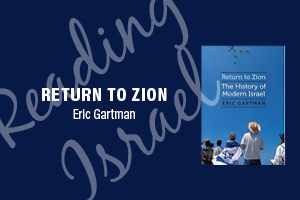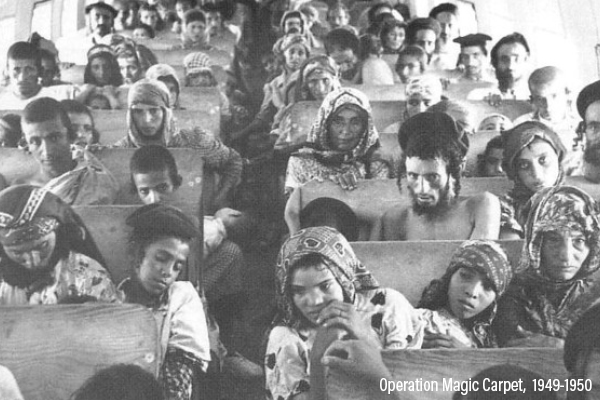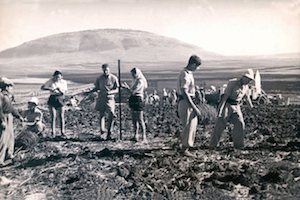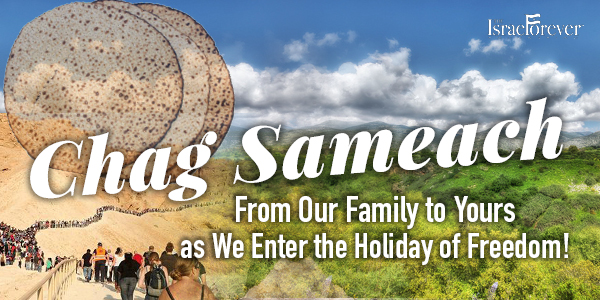Passover – The Modern Exodus
By Eric Gartman
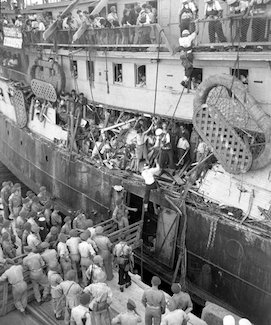
The Exodus in Haifa, Palestine, in 1947, when the 4,500 European Jews it was carrying were turned away by the British. Credit Associated Press
Passover tells the story of the Exodus from Egypt, when the ancient Israelites returned to the Promised Land. But within the last generation, another exodus took place. This time the shattered remnant of the Jews of Europe returned to the Jewish homeland after the Holocaust.
Like their ancient ancestors, their journey was a treacherous one. Whereas the ancient Egyptians had tried to prevent the Hebrews from leaving, after World War II, the British tried to prevent their descendants from entering their homeland where they might finally live free from persecution.
During the three years after the end of the Holocaust and the Second World War, hundreds of thousands of survivors, homeless, destitute, with no families left, languished in displaced person’s camps in post-war Europe. The conditions in these camps were deplorable. Ira Hirchmann, an American Jew, saw the filth and squalor firsthand at one such facility in Germany. The Jews were housed in a three-story cement garage, used by the Germans to store coal and lumber. He found 1,800 men and women living there “like cattle in an abattoir.” There were only three toilets for the nearly two thousand people. They lived ate, and slept on double decker beds and cots with no room for the clothes and personal items.
“Although my first impulse was to run from such a revolting scene,” Hirchmann admitted, “I forced myself to circulate through the narrow spaces between cots and to try to understand how people could remain alive and human when forced by civilization into a subhuman state.” What he saw shocked him: “As far as the eye could reach stretched this sea of men and women sitting on cots, staring silently at me. It was late afternoon. The rain and wind blew in fitfully through the glassless windows; the odor of heavy, sweat-drenched clothes, of unwashed bodies, of the dankness of cement floors and walls, and above it all the stench of urine and human excrement, was overpowering…Some of those wretched souls clutched at me as I passed, seeing that I was a stranger; perhaps someone who might help.”
These survivors wished to flee Europe for Palestine, the Land of Israel where the Jewish nation was being reestablished after generations of exile. “Poland held too many bitter memories for me,” one survivor explained. “I despised the resentment of the people towards the pitiful handful of Jews who had survived the Hitler period, and I was sickened by the attitude of the Polish Government officials, who pretended that anti-Jewish sentiment did not exist.” Instead, he explained why he wished to go to Palestine: “For me, a homeland for the Jews seemed the only possible answer.”
All other nations had homelands, and it seemed in the wake of the Holocaust that the only way to ensure Jewish safety was through a Jewish state: “I was steadfast and determined in my desire to leave Poland, to reach Palestine, and to join with Jews from all over the world in working-and fighting-for a homeland for my people.”
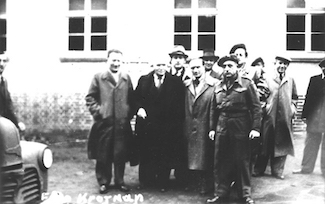
David Ben-Gurion visits Holocaust survivors in Bergen-Belsen, Germany, October 1945
David Ben-Gurion himself went to assess the situation in one camp. An American Jewish chaplain named Judah Nadich drove Ben-Gurion to a displaced persons camp near Dachau. The inmates erupted when they saw him, even though they did not know he was coming. Nadich wrote:
"Suddenly, one of the Jews...happened to peer into my automobile and, recognizing the strong face and the white shock of hair, suddenly screamed in an unearthly voice, 'Ben-Gurion! Ben-Gurion!’ Like one man, the entire group turned toward the car and began shrieking, shouting the name of the man who was accepted by all of them as their own political leader."
Nadich assembled the inmates in the camp auditorium. Then came the great moment: He led Ben-Gurion into the packed auditorium. Every seat was taken, the aisles were full. The hall overflowed, those who couldn’t get in stood by the doors and leaned into the windowsills. As Ben-Gurion entered the crowd erupted in song –Hatikvah – the hope, the Zionist anthem.
“The hope that had never died, the hope that was unquenchable in their breasts, the hope that had kept them alive,” Nadich explained. “As Ben-Gurion stood on the platform before them, the people broke forth into cheers, into song, and finally, into weeping. For the incredible was true; the impossible had happened. Ben-Gurion was in their midst and they had lived despite Hitler, the Nazis, and all their collaborators, with all the diabolical instruments of destruction at their command—they had lived despite them all to this day when they could welcome Ben-Gurion!”
He was the embodiment of all their hopes and aspirations. The black night was over, and the first rays of a new dawn were bursting over the skies of their miserable camp. The displaced persons (DPs) sang, cheered, and wept as Ben-Gurion told them they would soon come home to Zion.
But the British, sensitive to the desires of the Arabs, refused them entry. The ragged survivors would not be denied, however. With the British refusal to allow Jews into Palestine, the refugees began to take matters into their own hands. Aided by the Jewish Brigade and the Mossad, the Israeli intelligence service, the refugees began to seek to enter Palestine clandestinely.
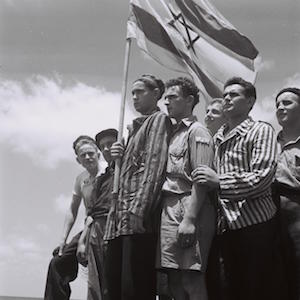
July 15, 1945. Buchenwald survivors arrive in Haifa to be arrested by the British.
The operation was known as Bricha (escape). Establishing a network of safe houses and schools, the Bricha bribed border guards, taught the refugees Hebrew, and brought them from the camps to ports in the Mediterranean where they were crammed onto ships bound for Palestine. In the three years after the end of the war, thirty-five ships and over 50,000 refugees attempted to enter Palestine. Most were stopped by the British navy, and their passengers interred in camps on the island of Cyprus. Golda Meir went to see the camps for herself. She was appalled by what she saw:
The camps themselves were even more depressing than I had expected, in a way worse than the camps for DPs that were being run in Germany by the US authorities. They looked like prison camps, ugly clusters of huts and tents—with a watchtower at each end-set down on the sand, with nothing green or growing anywhere in sight. There wasn't nearly enough water for drinking and even less for bathing, despite the heat. Although the camps were right on the shore, none of the refugees was allowed to go swimming, and they spent their time for the most part, sitting in those filthy, stifling tents, which, if nothing else, protected them from the glaring sun. As I walked through the camps, the DPs pressed up against the barbed-wire fences that surrounded them to welcome me, and at one camp two tiny little children came up with a bouquet of paper flowers for me. I have been given a great many bouquets of flowers since then, but I have never been as moved by any of them as I was by those flowers presented to me in Cyprus by children who had probably forgotten—if they ever knew—what real flowers looked like.
Meir was shocked that the Holocaust survivors were being locked up again under conditions that were little better than the concentration camps. But the fate of another refugee ship would change the modern Exodus and end the exile of Jews from their homeland once and for all.
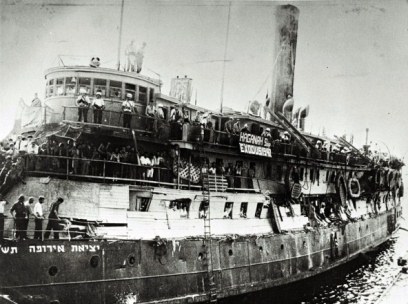
The crowded illegal immigration ship Exodus, carrying Jewish refugees from war-torn Europe enters Haifa port on July 18, 1947 after three hours of combat with the British navy.
On July 18, 1947 a rickety old river steamer from the United States chugged toward the port of Haifa. Although it was designed to hold 400 people, no fewer than 4,500 concentration camp survivors were crammed together in the most unsightly and unsanitary manner imaginable. Renaming their ship the Exodus 1947, they had departed France a few days before. As it neared Haifa, a British armada of six destroyers and one cruiser bore down on the Exodus. The British captain hailed the refugee ship: “I must warn you that illegal entry of you passengers into Palestine will not be allowed; and your ship will be arrested if you try to do so. We do not want to hurt anyone, but if you resist force will be used…I repeat force will be used if our sailors are attacked. Your leaders and all sensible passengers must stop the hot heads from futile resistance.”
“On the deck of this boat, the Exodus, are more than 4,000 people, men, women, and children, whose only crime is that they were born Jews,” the refugees defiantly retorted. “We have nothing against your sailors and officers, but unfortunately they have been chosen to implement a policy to which we shall never acquiesce, for we shall never recognize a law forbidding Jews to enter their country. We are not interested in the shedding of blood, but you must understand that we shall not go to any concentration camp of our own free will, even if it happens to be a British one.”
The battle lines were drawn. The Jews would not surrender; the British would not allow them entry into Palestine. The British captain gave the orders. The armada machine-gunned the Exodus. Still the ship would not surrender. Two destroyers rammed the fragile ship from opposite sides, smashing into its upper deck. When this too failed to deter the refugee steamer, British sailors stormed the ship. They were assailed with stream jets, smoke bombs, fireworks, and whatever the refugees could get their hands on. The refugees coated the decks with oil, making them slippery for the boarding teams. ‘I tried to get on board three times but there was too much opposition in the shape of big Yids, a British seaman told his captain. “I was forced to draw my revolver and fired eleven warning shots. One of the last shots, however, I used to stop a lad of 17 or 18 from collecting my scalp with a meat axe. He got it in the stomach.
The boarding party fanned out on the old tub and clubbed the captain to death, killed two others, and wounded many more. Still, the ship refused to surrender. Only when the continued ramming of the ship threatened to sink it did the Exodus give finally give in after three hours of fighting. Riddled with holes and listing badly, the ship was towed into Haifa harbor. At the dock, a crowd of several thousand Jews looked on and cheered their brethren while the passengers sang Hatikvah. As reporters and photographers looked on, American journalist Ruth Gruber described the horrific state of the Exodus:
The ship looked like a matchbox that had been splintered by a nutcracker. In the torn, square hole, as big as an open blitzed barn, we could see a muddle of beddings, possessions, plumbing, broken pipes, overflowing toilets, half-naked men, women looking for children; railings were ripped off; the lifesaving rafts were dangling at crazy angles… A child came off, with large frightened eyes. He carried a potato sack with his belongings; a blanket was strapped across his back. A man and a child came down, hand in hand. The child broke away and ran back up the gangway, looking for his mother. He was sobbing with fright. The soldiers gently pulled him down the gangway again. No one was allowed to return to the ship… The people trickled down the gangways in little groups and milled about on the dock like frightened animals. They looked weary and shattered, mourning their dead and hundreds wounded. Surrounded by troops to prevent their escaping into Haifa, they made their first step on the dreamed-of soil. They breathed the air deeply and tiredly… On the pier, the British took off every bandage and examined every wound to make sure that only the serious cases stayed. Some of the wounded screamed with pain as their head dressings were untied and then tied up again. A military ambulance waited on the dock. When the army doctor nodded his head, a patient was placed on one of the ambulance gurneys. To be sent to Haifa’s hospitals, they had to be more to the dead than to the living… The refugees looked up at Mount Carmel and seemed to say to themselves, This land is mine. Soon it will be mine forever. They’re only taking us to Cyprus. We’ll be there only a year or two. Then we’ll come back with visas. We’ll come back forever… By this time the heat had become suffocating. The babies, who had been incredibly quiet, began to cry. Men looked dazed and ready to collapse as red-bereted soldiers shoved them along the last mile. Members of families, separated for the search pens, were taken to different transports. They were reassured that they would be reunited the next day in Cyprus.
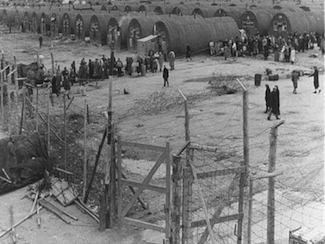
British detention camp on Cyprus.
But the British government had no intention of sending the refugees to Cyprus. His majesty’s government wanted to make an example to discourage further immigration attempts. They placed the refugees on prison ships and sent them back to their port of origin in France. The British insisted the French forcibly disembark the passengers. The French government, sensitive to the plight of the survivors of Hitler's Final Solution, adamantly refused. The refugees refused to disembark, stating “We will go ashore in Europe only as dead men.” In the suffocating mid-summer heat a contagion of rashes and boils broke out among the passengers. The French government offered them medical care, but to do so meant leaving the ship. The refugees refused, insisting they would only disembark in Eretz Yisrael. After the heat wave, heavy rains rocked the ships for four days. Below deck in the prison cages, there was not enough room for the refugees to lie down. They were forced to stand upright against each other as the rain streamed against their bodies. When the storms ended, the heat returned.
The British had been convinced that the heat and storms would force the refugees to disembark the ships. Yet the Jews continued to defy them. The British then announced that those that did not leave the ships would be taken to Germany. The British were certain that the Holocaust survivors would not willingly go back to the land of their murderers. Once again, they were wrong. The refugees voted to stay on board. “The stand taken by the immigrants in their struggle has written a brilliant page in the history of the Jews’ fight for their freedom,” the Haganah extoled.
As the ships were awaiting the trip to Germany, journalist Gruber was allowed on board. She described the refugee’s plight as she was led down to the ships’ prison hold, which was essentially a large iron cage:
Squeezed between a green toilet shed and some steel plates were hundreds and hundreds of half-naked people who looked as though they had been thrown together in a dog pound. Trapped and lost, they were shouting at us in all languages, shattering each other's words. Some pressed their faces against the slanted fencing and their bodies looked broken and distorted. We watched the cage grow tighter and wilder as more people forced their way from somewhere in the bowels of the ship and pushed against the people already inside the narrow cage. The hot sun filtered through the grillwork, throwing sharp lines of light and darkness across the refugees' faces and their hot, sweaty, half-naked bodies. Women were nursing their babies. Old women and men sat weeping unashamed. There were no beds in the hold. Each man, woman, and child slept on a brown army blanket folded neatly on the slimy floor. The blanket was each person’s living space, his dining room, his bedroom and his study. Sometimes three or four people lay on a single blanket. Each man’s space was bounded only by the dimensions of his body.
Nonetheless, when a French journalist asked if the refugees wanted to get off the ship, the reply came back: “We will come down willingly only in Palestine. Here we will come down as corpses.”
The ships set sail for Germany. The refugees described the trip there as the most interminable part of their entire ordeal: “We got two meals a day,” one man recalled. “For breakfast it was salty tea and we each got a package of British C-ration biscuits from New Zealand, and inch and a half by an inch and a half, ten in a package. When you broke them open to eat them, there were maggots in them. The evening meal was potato soup with the C-ration biscuits soaking in the soup, and for protein, the maggots were swimming around in it. When you’re hungry, you eat it, maggots and all.” When the ships arrived in Hamburg Germany, British soldiers awaited them on the docks, as did members of the media. The British demanded the passengers disembark. Once again, they refused.
Gruber recorded the ensuing chaos: “Inside the holds, the people joined hands and danced the hora, singing passionately. Hundreds of troops were rushed aboard. The soldiers ran down the steps to the holds and with clubs and hoses forced the refugees against the walls. Bucket-brigade fashion, they passed the people up the slippery stairs, across the deck, and down gangway to the wharf. Some were beaten with batons, others were kicked, pulled by the hair, and rolled down like felled trees. One of the refugees, dragged down the gangplank, shrieked, “They shall not keep us from our homeland.” The Holocaust survivors were then placed into displaced person camps in the very land of their people's murderers.
The saga of the Exodus was finally over. It had lasted two months and shocked the world. But it had brought the plight of the Jewish refugees to the forefront of the world’s agenda. And their sacrifices paid off as a short time later the United Nations voted to create the State of Israel. On May 14, 1948, the modern Exodus finally ended after two thousand years.

Born in Israel to American parents, historian Eric Gartman never lost his fascination for the Jewish homeland. He is the author of Return to Zion: The History of Modern Israel, (2015), a critically-acclaimed narrative of the birth and survival of the Jewish State.
Recommended:
YOUR ISRAEL CONNECTION FOR PASSOVER
Bring Israel into your Passover Seder today!
About the Author


